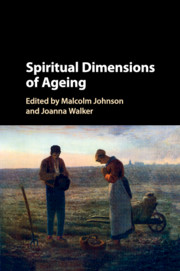Book contents
- Frontmatter
- Contents
- List of Contributors
- Preface
- Acknowledgements
- 1 Spirited Ageing
- Part I The Spiritual Journey of Ageing
- Part II Cultures of the Spirit in Modernity
- 6 Religion, Belief and Spirituality in Old Age: How They Change
- 7 Ritual and Memories of Ritual in Older People's Lives: Contrasts between Eastern and Western Europe
- 8 Religious Ritual and Practice in Old Age
- 9 New Cultures of Ageing: The Impact of the Third Age on Issues of Spirituality and Religion
- Part III Searching for Meaning in Later Life
- Part IV Meeting Spiritual Needs in Older Age
- Index
- References
7 - Ritual and Memories of Ritual in Older People's Lives: Contrasts between Eastern and Western Europe
from Part II - Cultures of the Spirit in Modernity
Published online by Cambridge University Press: 22 December 2016
- Frontmatter
- Contents
- List of Contributors
- Preface
- Acknowledgements
- 1 Spirited Ageing
- Part I The Spiritual Journey of Ageing
- Part II Cultures of the Spirit in Modernity
- 6 Religion, Belief and Spirituality in Old Age: How They Change
- 7 Ritual and Memories of Ritual in Older People's Lives: Contrasts between Eastern and Western Europe
- 8 Religious Ritual and Practice in Old Age
- 9 New Cultures of Ageing: The Impact of the Third Age on Issues of Spirituality and Religion
- Part III Searching for Meaning in Later Life
- Part IV Meeting Spiritual Needs in Older Age
- Index
- References
Summary
Religion is one of human culture's major sources of support for ageing. It provides well understood forms of ritualised meaning and belonging at key points in later life, particularly at times of bereavement as well as of life threatening illness, but also at joyous family events such as marriages and births. In her chapter in this volume, Ellen Idler (2016) refers to the essential role of ritual in religion and describes the benefits it brings to older people, arising out of the consistency of its performance over a lifetime, its physical and sensory nature, and the fact that it brings groups of people together in shared practice. Religious ritual is predictable, familiar and held in common. However, during the twentieth century, attendance at traditional communal religious ritual has declined in many parts of the Western world. New secular forms of ritual have emerged, sometimes intended to take the place of religious ritual, but it is questionable whether they yet provide equivalent psychological support to older people.
The European experience of religion varies considerably. Some countries are much more religious in attitudes and practice than others and there are no very clear geographical patterns (Eurobarometer 2005). There are particularly religious societies in the north as well as in the south of Europe, and more secularised societies in the east as well as the west. The historical experience of persecution by and of religious people also varies greatly between nations, and seems to have some relationship with the current status of religious practice within them.
In Russia from the time of the 1917 revolution, and in most parts of Eastern Europe following the installation of communist regimes after WWII, religious practice was discouraged and religious practitioners persecuted by explicitly atheist governments (Froese 2008). But religious practice survived, and since 1989 has been recovering some of its former position in society, including marking important occasions in the life of the nation, family and individual. In much of Western Europe, by contrast, religion remained an influential social force until the middle of the twentieth century. In the United Kingdom secularisation occurred more slowly and over a longer period of time, but it gathered particular pace in the 1960s and accelerated towards the end of the century (Brown 2001). Similar changes occurred in neighbouring countries, such as the Netherlands (Rooden 2010).
- Type
- Chapter
- Information
- Spiritual Dimensions of Ageing , pp. 106 - 122Publisher: Cambridge University PressPrint publication year: 2016
References
- 1
- Cited by



